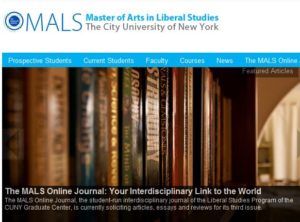
 The Masters of Arts in Liberals Studies Program (MALS) is a “unique interdisciplinary thirty-credit degree program that allows students to design and pursue an individual course of study, and to take courses in the Ph.D. programs.” The Digital Humanities track is one of its eighteen tracks. Copied below is the description for MALS 781000 – ” The Digital Humanities in Research and Teaching,” taught by Professors Matthew K. Gold and Stephen Brier:
The Masters of Arts in Liberals Studies Program (MALS) is a “unique interdisciplinary thirty-credit degree program that allows students to design and pursue an individual course of study, and to take courses in the Ph.D. programs.” The Digital Humanities track is one of its eighteen tracks. Copied below is the description for MALS 781000 – ” The Digital Humanities in Research and Teaching,” taught by Professors Matthew K. Gold and Stephen Brier:
The dramatic growth of the Digital Humanities (DH) over the past half dozen years has helped scholars re-imagine the very nature and forms of academic research and teaching across a range of scholarly disciplines, encompassing the arts, the interpretive social sciences, and traditional humanities subject areas. This course will explore the history of the digital humanities, focusing especially on the diverse pioneering projects and core texts that ground this innovative methodological and conceptual approach to scholarly inquiry and teaching. It will also emphasize ongoing debates in the digital humanities, such as the problem of defining the digital humanities, the question of whether DH has (or needs) theoretical grounding, controversies over new models of peer review for digital scholarship, issues related to collaborative labor on digital projects, and the problematic questions surrounding research involving “big data.” The course will also emphasize the ways in which DH has helped transform the nature of academic teaching and pedagogy in the contemporary university with its emphasis on collaborative, student-centered and digital learning environments and approaches. Along the way, we will discuss broad social, legal and ethical questions and concerns surrounding digital media and contemporary culture, including privacy, intellectual property, and open/public access to knowledge and scholarship. Students will be expected to participate actively in class discussions and online postings (including on blogs and wikis) and to research and write a final multimedia presentation on a key topic in the digital humanities. Students completing the course will gain broad knowledge about and understanding of the emerging role of the digital humanities across several academic disciplines and will begin to learn some of the fundamental skills used often in digital humanities projects.


